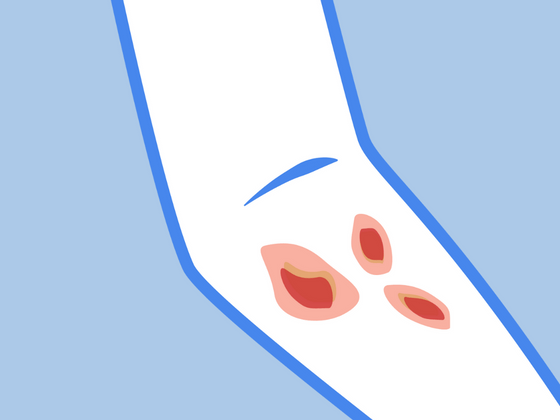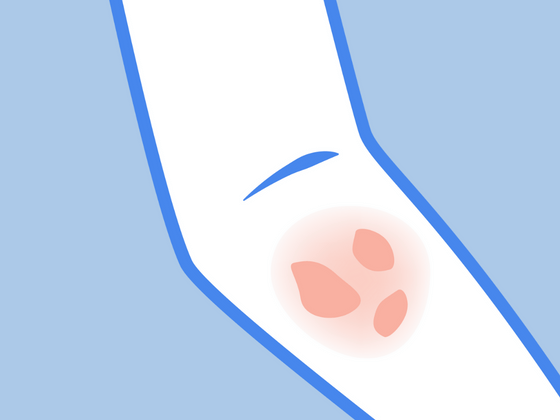Are you struggling with itchy and dry skin that seems to have no identifiable cause? You could be suffering from eczema or atopic dermatitis, a chronic skin condition affecting millions worldwide. Eczema is characterized by itchy, dry, or weeping skin, often due to an over-reactive immune system and decreased skin barrier function.
Research shows that, in addition to following an eczema-friendly diet, supplementing with vitamins and minerals can greatly reduce eczema symptoms and help improve overall skin health.
In this blog post, we will discuss the connection between vitamins and eczema in more detail, including:
-
Which vitamins and supplements are best for treating eczema
-
How do these vitamins help relieve eczema symptoms
-
What foods can these vitamins be naturally sourced from
Read on to learn more about vitamins and ezcema.
Vitamin A
Vitamin A is known for its antioxidant properties and is crucial to skin health. Oxidative stress—often caused by smoking, poor diet, and environmental pollutants—is believed to contribute to inflammation and the worsening of atopic eczema symptoms. Vitamin A possesses antioxidant and anti-inflammatory properties that can help reduce this oxidative stress and support healthy skin barrier function.
Foods rich in Vitamin A include Hard-boiled eggs, Yogurt, Oranges, Carrots, Green Peas, Beef Liver, and Blue Cheese.
Vitamin B12
Vitamin B12 is essential for various bodily functions such as neurological function, red blood cell formation, and DNA synthesis. Vitamin B12 is also known to help lessen the symptoms of skin conditions such as acne, atopic dermatitis, and psoriasis by reducing nitric oxide production. Nitric oxide (NO) plays a fundamental role in food allergies, skin conditions, and intestinal inflammation. By reducing levels of nitric oxide in the body, Vitamin B12 soothes inflammation, which helps decrease eczema severity by managing painful symptoms and flare-ups.
Stress is another leading cause of stubborn eczema flare-ups for many people. Vitamin B12 regulates the nervous system and supports neurological health; therefore, it is known to help mitigate the effects of stress on the body and improve eczema symptoms.
Vitamin B12 super-foods include Fortified Cereals, Cheese, Eggs, Liver, Kidneys, Milk, and Fish.
Vitamin C
Known for its immune-boosting properties, Vitamin C is essential for collagen synthesis and skin and tissue repair. Its antioxidant properties accelerate collagen and elastin production, ensuring skin remains smooth, youthful, and firm. Vitamin C can also act as an antihistamine by reducing inflammation, redness, and swelling associated with allergic reactions and skin conditions like eczema.
Although eating a well-balanced, healthy diet should provide enough Vitamin C, those with Vitamin C deficiencies may benefit from taking Vitamin C supplements. Research shows that consuming Vitamin C-rich foods and utilizing Vitamin C serums topically can help alleviate inflammatory skin conditions like eczema and enhance your skin's barrier function and natural defense mechanisms.
Broccoli, Kiwis, Guavas, Kale, Bell Peppers, Citrus Fruits, and Strawberries are rich in Vitamin C.
Vitamin D
Have you noticed that your eczema symptoms improve in the summer? This is because your skin produces Vitamin D - sometimes called the 'sunshine vitamin' - when exposed to the sun.
Studies have observed that individuals living in areas with low sunlight levels have increased rates of Vitamin D deficiency and thus increased cases of eczema and atopic dermatitis. By gradually increasing your time in the sun, you can help kill bacteria on your skin and regulate the immune response and chronic inflammation associated with eczema and atopic dermatitis.
If you live somewhere that doesn't get much sun all year round, speak to your doctor about using Vitamin D supplementation to help raise your Vitamin D levels and reduce the symptoms of eczema.
Vitamin D can also be found naturally in foods such as Oily Fish, Egg Yolk, and Liver.
Vitamin E
Vitamin E is an essential micronutrient often used in skin care products. Its ability to protect the skin against oxidative stress and combat some symptoms of inflammatory skin conditions, such as eczema and atopic dermatitis, makes it a valuable ingredient. Natural moisturizers like beef tallow cream also provide similar protective benefits.
Like Vitamin A, Vitamin E is a fat-soluble antioxidant that helps strengthen the skin's moisture barrier, which is essential for those with eczema. Vitamin E also plays a crucial role in wound healing as it promotes tissue repair and regeneration, helping to heal lesions, abrasions, and other eczema-related wounds and prevent secondary infections.
Topical eczema cream containing Vitamin E can be used to treat eczema symptoms and soothe inflamed skin. However, Vitamin E can also be sourced from the following foods: Pumpkin, Mango, Avocado, Eggs, Sweet Potato, Salmon, and Leafy Greens like Spinach, Cauliflower, and Broccoli.
Zinc
Zinc is known for its ability to soothe the skin and reduce inflammation, making it a super helpful tool for treating atopic dermatitis and eczema symptoms. Zinc is also full of antibacterial properties and creates a protective layer on top of the skin, helping our skin to retain moisture and maintain its overall health.
If you are struggling with chronically dry and itchy skin, try our Remedywear™ garments, which are made with soothing TENCEL and embedded with antibacterial Zinc Oxide. Our Long-Sleeve Shirt, available for adults and kids, offers a gentle layer of protection for your skin while helping to reduce bacterial growth, block odor, and soothe sore skin caused by eczema flares.
Zinc can also be found naturally in some foods such as Oysters, Crab, Red Meat, Fish, Poultry, and Egg Yolk.
Fish Oil
Fish oil helps boost your intake of omega-3 fatty acids, which are known to support skin health due to their powerful anti-inflammatory properties. These essential fatty acids can also help suppress immune cells' activity, which is known to trigger eczema.
Foods high in omega-3 fatty acids include Fatty Fish, Flaxseeds, Chia Seeds, Hemp Seeds, and Walnuts.
Melatonin
Melatonin is not just used for treating sleep disturbances; it can sometimes be used in eczema treatment! Melatonin is an antioxidant and can reduce inflammation and swelling caused by atopic dermatitis. Moreover, as individuals with eczema often experience disrupted sleep patterns due to itching and discomfort, using a sleep supplement can help improve sleep quality and duration, allowing the body to rest and recover better.
Melatonin can also be found in some foods! For example, Cherries, Pistachios, and certain vegetables like Corn, Tomatoes, Asparagus, and Olives. However, it is important to note that these foods only contain trace amounts and are not likely to have a noticeable effect on sleep.
Explore Vitamins and Supplements for Eczema Today
Follow these tips to help you decide which dietary supplements and eczema vitamins are best for treating your eczema symptoms and improving your overall skin health today.








